Child stroke survivor determined to recover say Lowestoft parents
- Published
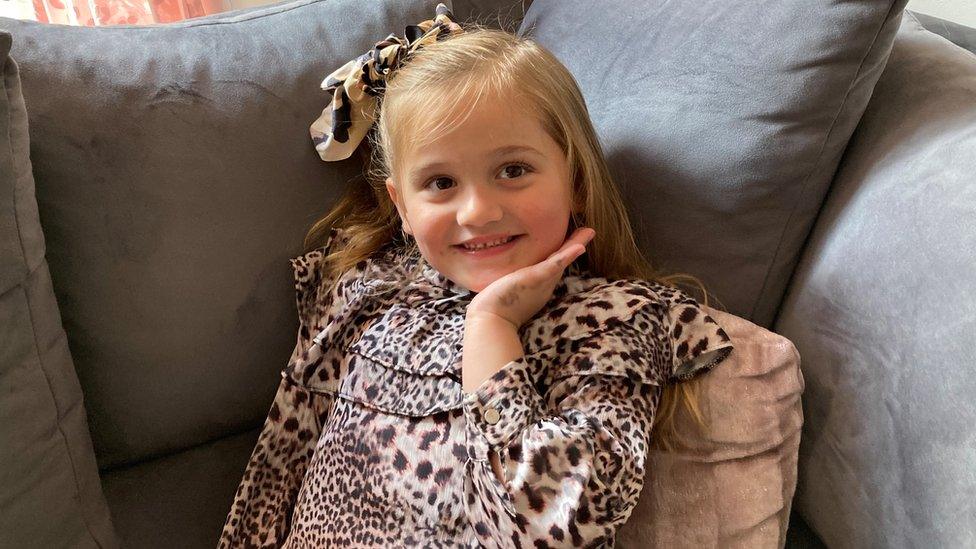
Tilli had a stroke two weeks after her fifth birthday
It was just two weeks after her fifth birthday when Tilli had a stroke at school, out of the blue.
There were no warning signs, her parents Carly Brown and Zak Cremin say, and she had gone in to her classroom in Lowestoft, Suffolk, as normal.
"It absolutely broke me, I thought I was going to lose her," Carly says.
The family thought strokes only happened to the elderly. But they can affect people of any age and 400 children in the UK have one every year, according to The Stroke Association.
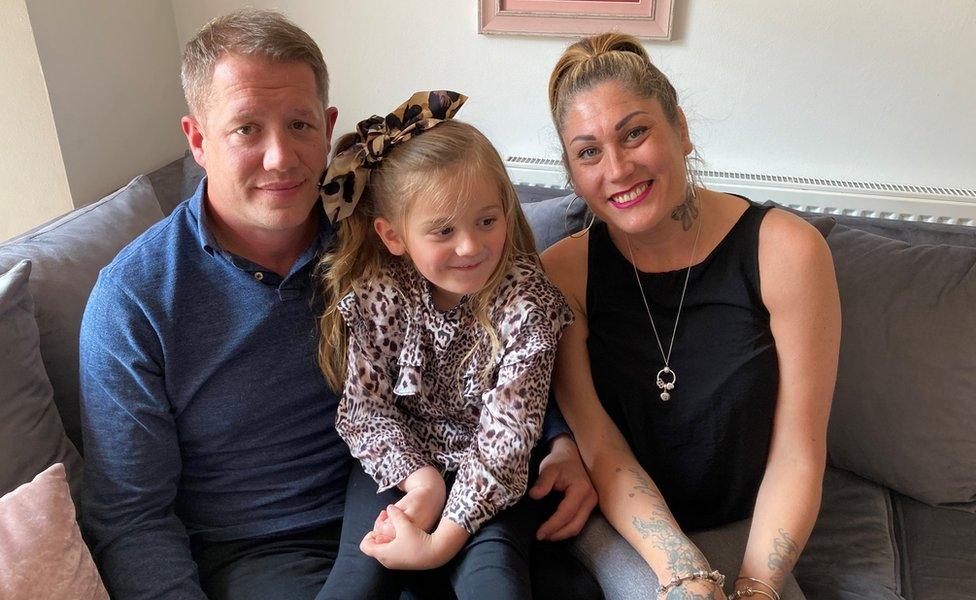
Tilli's parents say there were no signs before she had a stroke
Carly was still in her pyjamas doing housework on 5 April when she got the phone call from the school, saying "you've got to get here straightaway, there's an ambulance on its way".
"I was in a state of shock," she says. "They said 'Tilli's had a seizure'. I just put my coat on and ran to the school as quickly as I could. When I got there, she was laying there lifeless in her teacher's arms, it was horrific."
When Tilli initially came round at James Paget University Hospital in Gorleston, Norfolk, she was "walking properly and talking properly... The hospital told us at first she hadn't had a stroke, it was a huge relief," Zak says.
But 10 minutes later she had another stroke.
"They said the first one at the school was the beginning of a stroke and it was a full one at the hospital," he adds. "The second was really bad, her face had gone and everything, and she didn't even try to talk.
"It scared me but we had to keep calm for Tilli because she didn't know what was going on."
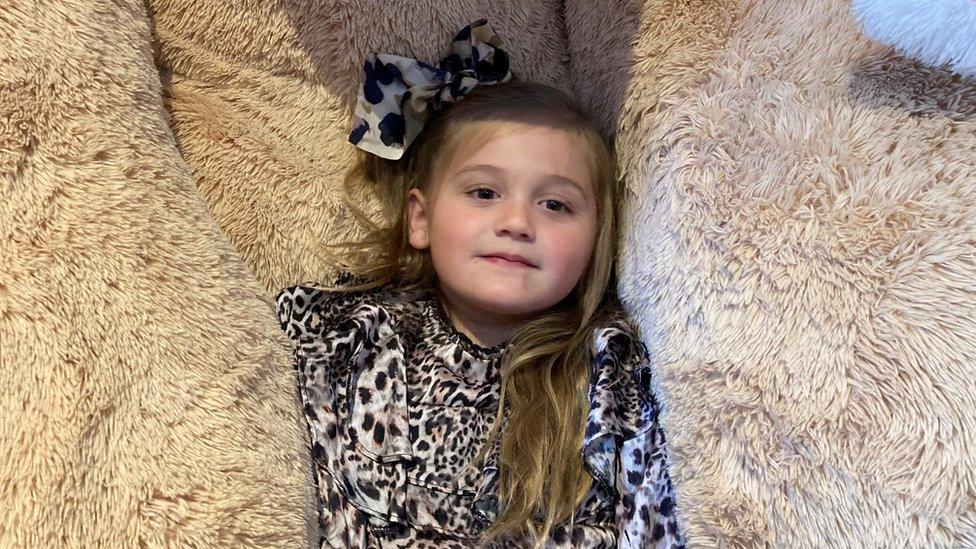
Tilli began behaving like a three-year-old after her stroke
Tilli, who has three sisters and a brother, was transferred to Addenbrooke's Hospital in Cambridge where she stayed for a full week.
She was on three weeks of high-dose steroids and now takes blood thinners every night.
Doctors believe her stroke was caused by vasculitis, an inflammation of blood vessels.
Tilli recently returned to the classroom for up to three hours a day, but her parents saw a "huge" change in their little girl, who was "very forward in her development and learning" before the stroke.
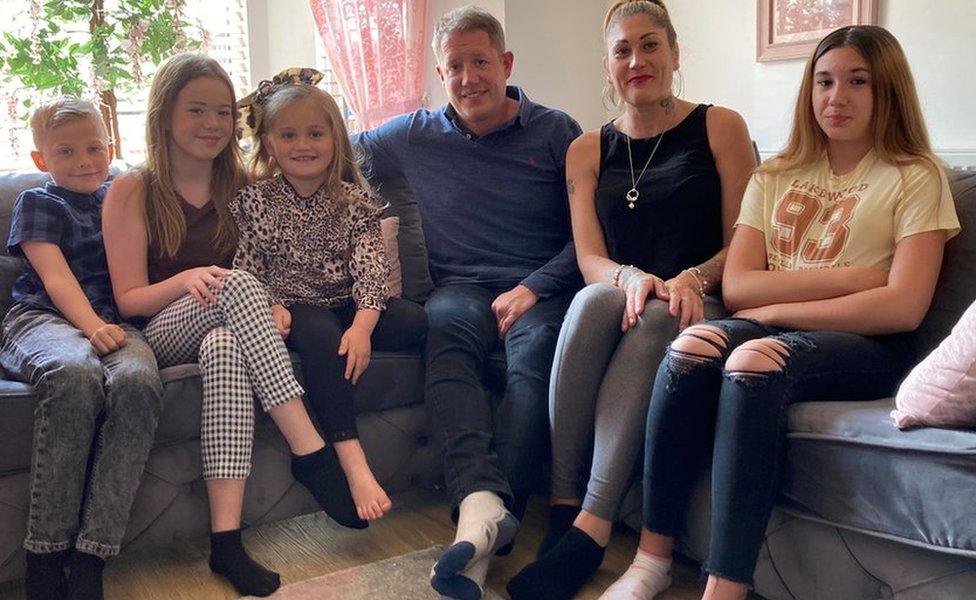
Tilli has a brother, Ronan, 10, and sisters Polly, 11, left of Tilli, and Ellisia, 13, right, plus sister Chloe, 20, not in the photo
"It's been really hard because although she's mentally clever still, she's still got her intelligence, it's like she's a three-year-old again," Carly says.
Tilli has had tantrums in the shops when she has not been able to get an item she wants and she "throws stuff on the floor, pulls my hair and hits me".
"There's massive frustration I think because of what happened," she says.
Tilli's speech is returning and she can walk again but she drags her right foot, and although she can grab with her hand, she cannot open her hand again.
She has just started four weeks of physio treatment in Manchester, more than 200 miles (322km) away from home.
The schoolgirl will then undergo eight weeks of treatment at a specialist children's hospital in Surrey.
Her parents say they "just want Tilli back" and hope that the three months of treatment, some of which they have fundraised for, will get her back on track.
The treatment will include physiotherapy, speech therapy and counselling, and she will be having MRI (magnetic resonance imaging) scans every six months.
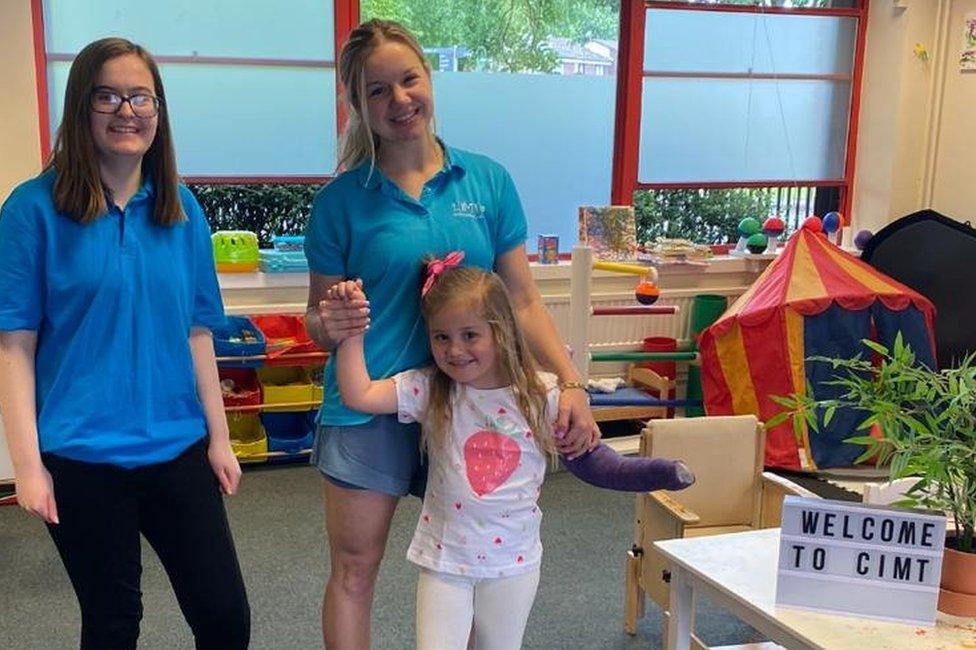
Tilli has started four weeks of treatment in Manchester
Doctors have told her parents that how well she recovers is "down to Tilli".
"Luckily for us, she's so determined; as soon as she's got something in her head, she's doing it and I'm so glad that she is like that," Carly says. "It's going to be a long, long time. I just want her better, I'd do anything."
Meanwhile, the determined youngster, who had just started to ride a bike without stabilisers, has already mastered how to write with her left hand, her less dominant side.
And her dad is looking forward to her re-learning other skills.
"I'm going to get the enjoyment of teaching her how to ride a bike again, and seeing her face when she does learn to do things again, the happiness of doing it again, that'll be nice," he says.
"There are major things she can't do which she could do before that I look forward to her being able to do again."
'Life after stroke is possible'
Katy Rothwell, head of experience and development at the Stroke Association, says a childhood stroke is life changing and the effects are different for every child and their family.
"There is hope and with help and support, children and their families can rebuild their lives after stroke," she says.
"Usually the fastest recovery happens in the early weeks and months following a stroke, but can continue for months or years after a stroke. It takes time and hard work, and rehabilitation therapies are crucial, but life after stroke is possible."

Find BBC News: East of England on Facebook, external, Instagram, external and Twitter, external. If you have a story suggestion email eastofenglandnews@bbc.co.uk, external